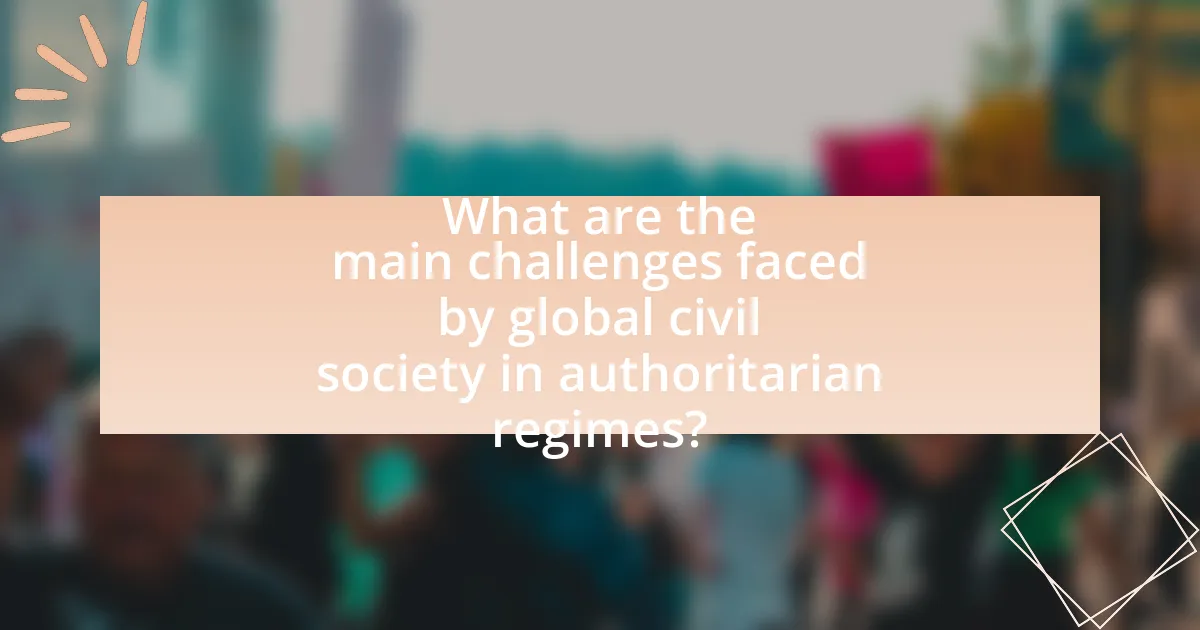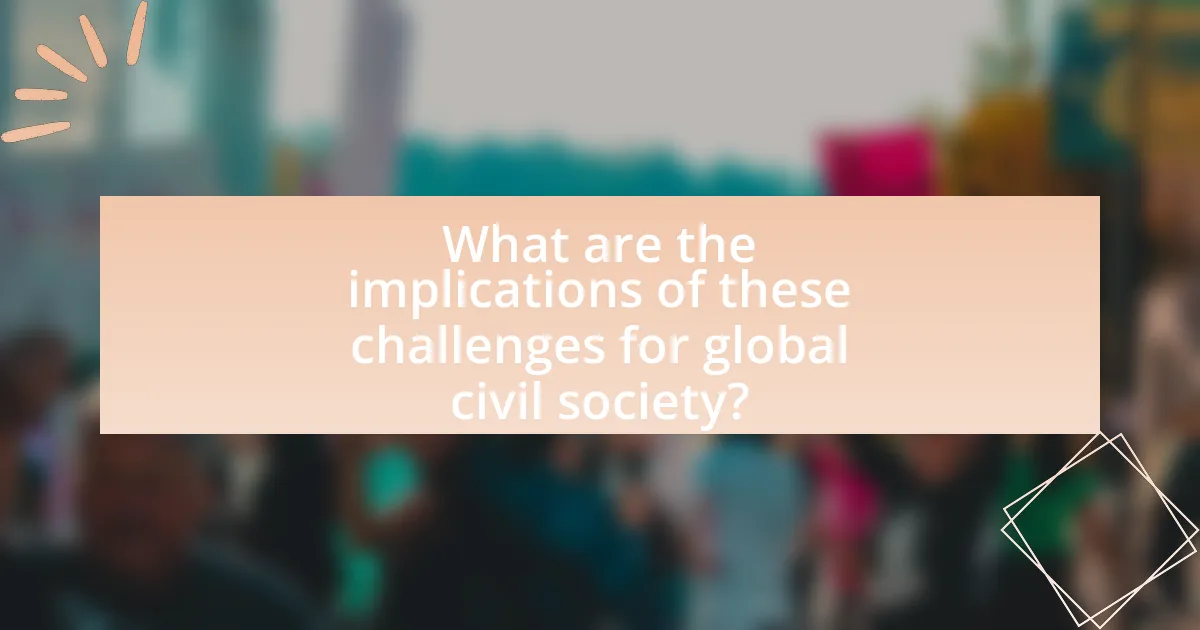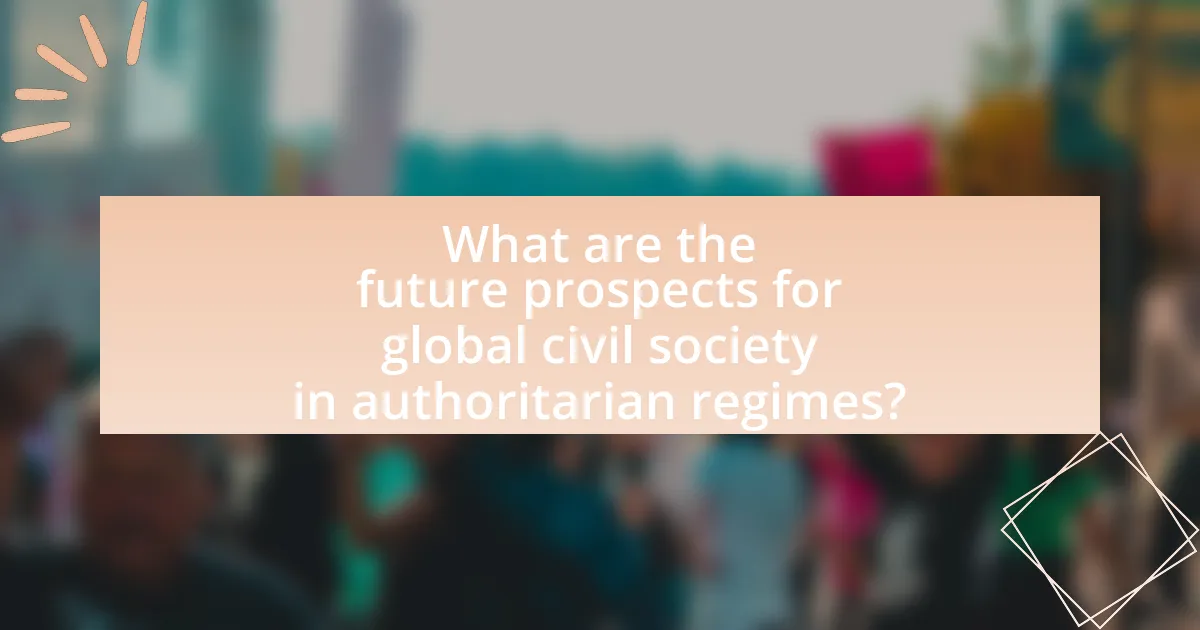Global civil society faces numerous challenges in authoritarian regimes, including repression of freedoms, restricted access to information, and limited funding. Authoritarian governments employ tactics such as censorship, intimidation, and violence, which significantly hinder the operations of civil society organizations. These restrictions not only diminish the capacity for advocacy and mobilization but also undermine democratic processes and human rights. The article explores the specific limitations imposed by authoritarian regimes, the crucial role of global civil society in advocating for change, and the innovative strategies organizations employ to navigate these oppressive environments. Additionally, it examines the implications of these challenges for democracy and human rights, as well as the future prospects for civil society in such contexts.

What are the main challenges faced by global civil society in authoritarian regimes?
Global civil society faces significant challenges in authoritarian regimes, primarily including repression of freedoms, restricted access to information, and limited funding. Authoritarian governments often suppress dissent through censorship, intimidation, and violence, which hinders civil society organizations’ ability to operate effectively. For instance, according to the Freedom House report, many countries experience a decline in political rights and civil liberties, making it increasingly difficult for civil society to advocate for change. Additionally, authoritarian regimes frequently control media outlets, limiting the dissemination of information and obstructing civil society’s efforts to raise awareness about human rights abuses. Financial constraints also pose a challenge, as these regimes may restrict foreign funding or impose stringent regulations on NGOs, further undermining their capacity to function.
How do authoritarian regimes impact civil society organizations?
Authoritarian regimes significantly restrict civil society organizations by limiting their operational freedom and imposing strict regulations. These regimes often employ tactics such as censorship, surveillance, and intimidation to suppress dissent and control the activities of these organizations. For instance, in countries like Russia and China, laws have been enacted that require NGOs to register with the government, face heavy scrutiny, and often operate under severe restrictions, effectively stifling their ability to advocate for human rights or engage in political discourse. This suppression leads to a diminished capacity for civil society organizations to mobilize resources, engage with the public, and influence policy, ultimately undermining democratic processes and civic engagement.
What specific restrictions do authoritarian regimes impose on civil society?
Authoritarian regimes impose specific restrictions on civil society, including limitations on freedom of assembly, censorship of media, and suppression of dissent. These regimes often enact laws that prohibit public gatherings, making it difficult for civil society organizations to mobilize or advocate for change. Censorship is prevalent, with state control over media outlets and the internet, restricting access to information and stifling public discourse. Additionally, authoritarian governments may intimidate or imprison activists and leaders of civil society organizations, creating a climate of fear that discourages participation. For instance, in countries like Belarus and Venezuela, the government has used violence and legal repercussions against peaceful protests, demonstrating the extent of these restrictions.
How do these restrictions affect the operations of civil society organizations?
Restrictions significantly hinder the operations of civil society organizations by limiting their ability to mobilize resources, engage with communities, and advocate for change. These organizations often face legal barriers, such as stringent registration processes and funding limitations, which can stifle their activities and reduce their effectiveness. For instance, a report by the International Center for Not-for-Profit Law indicates that over 60 countries have enacted laws that severely restrict foreign funding for civil society, directly impacting their operational capacity. Additionally, restrictions on freedom of assembly and expression can prevent organizations from organizing events or campaigns, further isolating them from the communities they aim to serve.
Why is the role of global civil society crucial in authoritarian contexts?
The role of global civil society is crucial in authoritarian contexts because it provides a platform for advocacy, accountability, and support for human rights. In authoritarian regimes, where local civil society is often suppressed, global civil society organizations can mobilize international attention and resources to challenge oppressive practices. For instance, organizations like Amnesty International and Human Rights Watch document human rights abuses and pressure governments to adhere to international norms. This external pressure can lead to increased scrutiny and potential reforms within authoritarian states, as evidenced by the global response to the Arab Spring, where international civil society played a significant role in supporting local movements for democracy.
What functions do civil society organizations serve in authoritarian regimes?
Civil society organizations in authoritarian regimes serve several critical functions, including advocacy for human rights, providing social services, and fostering community engagement. These organizations often act as a counterbalance to state power by raising awareness of governmental abuses and mobilizing public opinion against oppression. For instance, during the Arab Spring, civil society groups played a pivotal role in organizing protests and disseminating information, which highlighted their capacity to challenge authoritarian governance. Additionally, they often fill gaps in social services that the state neglects, thereby gaining public trust and support. This dual role of advocacy and service provision underscores the importance of civil society organizations in promoting democratic values and social cohesion, even in repressive environments.
How do these functions contribute to social change or resistance?
Functions of global civil society, such as advocacy, mobilization, and education, contribute to social change or resistance by challenging authoritarian practices and promoting democratic values. Advocacy efforts raise awareness about human rights violations, influencing public opinion and policy changes. Mobilization of grassroots movements fosters collective action, empowering citizens to resist oppressive regimes, as seen in the Arab Spring where organized protests led to significant political shifts. Education initiatives inform communities about their rights and the importance of civic engagement, creating a more informed populace capable of demanding accountability from their governments. These functions collectively strengthen civil society’s role in resisting authoritarianism and driving social transformation.
What strategies do civil society organizations employ to navigate challenges?
Civil society organizations employ strategies such as coalition-building, advocacy, and leveraging technology to navigate challenges in authoritarian regimes. Coalition-building allows these organizations to unite diverse groups, enhancing their collective power and influence against oppressive policies. Advocacy efforts focus on raising awareness and mobilizing public opinion to pressure governments for change, often utilizing international platforms to amplify their voices. Additionally, leveraging technology enables civil society organizations to communicate, organize, and share information securely, circumventing state censorship and surveillance. These strategies are essential for sustaining their operations and promoting democratic values in restrictive environments.
How do civil society organizations adapt to restrictive environments?
Civil society organizations adapt to restrictive environments by employing strategies such as building coalitions, leveraging technology, and focusing on grassroots mobilization. These organizations often collaborate with other groups to amplify their voices and share resources, which enhances their resilience against repression. For instance, during the Arab Spring, many civil society organizations utilized social media platforms to organize protests and disseminate information despite government crackdowns. Additionally, they may shift their focus to less contentious issues or engage in advocacy that aligns with government priorities to avoid direct confrontation. This adaptability is crucial for their survival and effectiveness in authoritarian contexts.
What innovative approaches have emerged in response to authoritarianism?
Innovative approaches that have emerged in response to authoritarianism include digital activism, decentralized organizing, and transnational solidarity networks. Digital activism leverages social media and online platforms to mobilize support, disseminate information, and coordinate protests, as seen in movements like the Arab Spring and Hong Kong protests. Decentralized organizing allows grassroots movements to operate independently, reducing the risk of repression by authoritarian regimes, exemplified by the use of blockchain technology for secure communication and funding. Transnational solidarity networks connect activists across borders, facilitating resource sharing and strategic collaboration, which has been crucial in supporting local movements against authoritarianism. These approaches demonstrate adaptability and resilience in the face of oppressive governance.

What are the implications of these challenges for global civil society?
The implications of challenges faced by global civil society in authoritarian regimes include diminished civic space, increased repression of dissent, and weakened advocacy for human rights. Authoritarian regimes often impose restrictions on freedom of assembly, expression, and association, which directly undermines the ability of civil society organizations to operate effectively. For instance, according to the Freedom House report, 2021 marked the 15th consecutive year of decline in global freedom, indicating a trend where civil society faces heightened risks and limitations. This repression not only stifles local voices but also hampers international solidarity efforts, as global civil society struggles to mobilize support and resources in hostile environments. Consequently, the overall effectiveness of civil society in promoting democratic values and human rights is significantly compromised.
How do the challenges faced by civil society affect democracy and human rights?
Challenges faced by civil society significantly undermine democracy and human rights by limiting civic engagement and reducing accountability. When civil society organizations encounter repression, such as restrictions on funding, freedom of assembly, or censorship, their ability to advocate for democratic principles and human rights is severely compromised. For instance, according to the 2021 Freedom House report, countries with high levels of civil society repression often experience declines in political rights and civil liberties, indicating a direct correlation between the health of civil society and the state of democracy. This repression not only stifles dissent but also prevents marginalized voices from being heard, further entrenching systemic inequalities and human rights violations.
What is the relationship between civil society resilience and democratic movements?
Civil society resilience is crucial for the success of democratic movements, as it provides the necessary support structures and advocacy mechanisms that empower citizens to challenge authoritarian regimes. Resilient civil societies can mobilize resources, foster community engagement, and sustain activism despite repression, which is evidenced by the role of organizations like the Polish Solidarity movement in the 1980s, where grassroots mobilization led to significant political change. Furthermore, studies indicate that countries with strong civil society organizations are more likely to experience successful transitions to democracy, highlighting the direct correlation between civil society resilience and the effectiveness of democratic movements.
How do authoritarian regimes’ actions against civil society impact human rights advocacy?
Authoritarian regimes’ actions against civil society severely undermine human rights advocacy by stifling dissent and limiting the operational space for activists. These regimes often employ tactics such as censorship, intimidation, and legal restrictions to suppress civil society organizations, which are crucial for promoting and protecting human rights. For instance, according to the Freedom House report, in 2021, 73 countries experienced a decline in civil liberties, directly correlating with increased repression of human rights defenders. This repression not only silences voices advocating for change but also creates an environment of fear that discourages public engagement in human rights issues. Consequently, the effectiveness of human rights advocacy diminishes, as organizations struggle to operate freely and mobilize support.
What role does international support play in strengthening civil society?
International support plays a crucial role in strengthening civil society by providing resources, expertise, and legitimacy to local organizations. This support enhances the capacity of civil society groups to advocate for human rights, promote democratic governance, and mobilize communities against authoritarian practices. For instance, funding from international NGOs and governments can facilitate training programs that empower local activists, enabling them to effectively challenge oppressive regimes. Additionally, international advocacy can amplify the voices of civil society, drawing global attention to human rights abuses and pressuring authoritarian governments to reform. Research by the International Center for Not-for-Profit Law indicates that countries with robust international support for civil society often experience greater political pluralism and civic engagement, demonstrating the positive impact of such assistance on democratic resilience.
How can global partnerships enhance the effectiveness of civil society organizations?
Global partnerships can enhance the effectiveness of civil society organizations by providing access to resources, knowledge, and networks that strengthen their capacity to operate. These collaborations enable civil society organizations to share best practices and strategies, which is crucial in navigating the challenges posed by authoritarian regimes. For instance, partnerships with international NGOs can facilitate training programs that improve advocacy skills and increase organizational resilience. Additionally, global partnerships can amplify the voices of civil society organizations, allowing them to influence policy changes and mobilize support on a larger scale, as evidenced by the successful campaigns led by coalitions of civil society groups in various countries.
What are the risks associated with international support for civil society in authoritarian regimes?
International support for civil society in authoritarian regimes poses significant risks, including repression of activists, co-optation of civil society organizations, and backlash against foreign influence. Authoritarian governments often perceive external support as a threat, leading to increased surveillance, harassment, or imprisonment of activists, as seen in countries like Belarus and Russia. Additionally, regimes may manipulate or co-opt civil society organizations to legitimize their rule, undermining genuine grassroots movements. This dynamic can result in a backlash against perceived foreign interference, further entrenching authoritarian practices and diminishing the space for civil society.

What are the future prospects for global civil society in authoritarian regimes?
The future prospects for global civil society in authoritarian regimes are increasingly challenging due to heightened repression and restrictions on freedoms. Authoritarian governments are employing advanced surveillance technologies and legal frameworks to stifle dissent and limit civil society’s operational space. For instance, according to the Freedom House report, 2022 marked a record decline in global freedom, with many countries implementing laws that criminalize the activities of NGOs and activists. This trend suggests that civil society organizations will face greater obstacles in advocating for human rights and democratic governance, potentially leading to a decline in their influence and effectiveness.
How might the landscape of civil society evolve in response to authoritarianism?
The landscape of civil society may evolve towards increased resilience and adaptability in response to authoritarianism. As authoritarian regimes impose restrictions on freedoms and civil liberties, civil society organizations often adapt by employing innovative strategies such as digital activism, grassroots mobilization, and forming coalitions to amplify their voices. For instance, during the Arab Spring, civil society groups utilized social media platforms to organize protests and disseminate information, demonstrating how technology can empower collective action against oppressive regimes. Additionally, the rise of transnational networks allows local organizations to gain international support and visibility, further challenging authoritarian practices. This evolution reflects a dynamic response to repression, showcasing the ability of civil society to navigate and resist authoritarian constraints effectively.
What trends are emerging in civil society activism within authoritarian contexts?
Emerging trends in civil society activism within authoritarian contexts include the rise of digital activism, increased transnational solidarity, and the use of creative resistance strategies. Digital activism has gained prominence as activists leverage social media platforms to organize, mobilize, and disseminate information despite state censorship; for instance, the Arab Spring demonstrated how social media facilitated mass protests against authoritarian regimes. Increased transnational solidarity is evident as local movements connect with global networks, sharing resources and strategies, exemplified by the collaboration between activists in Belarus and international organizations during the 2020 protests. Creative resistance strategies, such as art and performance, have become vital tools for expression and dissent, as seen in the use of street art in Hong Kong to convey political messages. These trends reflect the adaptability and resilience of civil society in challenging authoritarianism.
How can technology influence the future of civil society in these regimes?
Technology can significantly influence the future of civil society in authoritarian regimes by facilitating communication, mobilization, and access to information. In these contexts, digital platforms enable activists to organize protests, share dissenting views, and connect with global networks, thereby challenging state control. For instance, during the Arab Spring, social media played a crucial role in mobilizing citizens against oppressive governments, demonstrating how technology can empower civil society. Furthermore, encrypted messaging apps enhance privacy and security for activists, allowing them to communicate without fear of surveillance. This technological empowerment can lead to increased resilience and adaptability of civil society organizations in the face of authoritarian repression.
What best practices can civil society organizations adopt to enhance their resilience?
Civil society organizations can enhance their resilience by diversifying funding sources, building strong networks, and investing in capacity building. Diversifying funding reduces dependency on a single donor, which is crucial in authoritarian regimes where funding can be restricted or withdrawn. Strong networks provide support and resources, enabling organizations to share knowledge and strategies for survival. Capacity building ensures that organizations develop the skills and infrastructure necessary to adapt to changing political environments. For instance, organizations that have successfully diversified their funding have shown greater stability and adaptability in the face of repression, as evidenced by case studies from regions experiencing authoritarian governance.
What strategies can be implemented to foster collaboration among civil society actors?
To foster collaboration among civil society actors, establishing networks and platforms for dialogue is essential. These networks facilitate communication, resource sharing, and joint initiatives, enabling actors to align their goals and strategies effectively. For instance, the Global Partnership for Social Accountability has successfully connected various civil society organizations, enhancing their collaborative efforts in governance and accountability. Additionally, providing training and capacity-building workshops can equip civil society actors with the necessary skills to work together more efficiently, as evidenced by programs implemented by organizations like the International Center for Not-for-Profit Law, which have shown improved collaboration outcomes.
How can civil society organizations effectively engage with local communities despite restrictions?
Civil society organizations can effectively engage with local communities despite restrictions by utilizing digital platforms and fostering grassroots networks. Digital tools enable organizations to communicate, share information, and mobilize support without physical presence, which is crucial in restrictive environments. For instance, during the Arab Spring, social media played a pivotal role in organizing protests and disseminating information, demonstrating the effectiveness of digital engagement. Additionally, building trust through local partnerships allows organizations to navigate restrictions more effectively, as local actors often have a better understanding of community dynamics and can facilitate outreach.